Major Depressive Disorder (MDD), also known as clinical depression, is a severe mental health condition that affects millions of people worldwide. It causes persistent feelings of sadness, hopelessness, and a lack of interest or pleasure in everyday activities. Unlike temporary mood fluctuations, MDD can severely impact a person’s quality of life, affecting their work, relationships, and overall functioning. In this article, we will explore the symptoms, causes, and treatment options for MDD.
Symptoms of Major Depressive Disorder
The symptoms of MDD can vary from person to person, but they generally interfere with daily life. Common symptoms include:
- Persistent sadness or low mood – Individuals often feel an overwhelming sense of sadness that lingers for weeks or months.
- Loss of interest or pleasure – A lack of interest in activities that once brought joy or fulfillment, such as hobbies or socializing.
- Fatigue or low energy – Feeling exhausted or drained, even after adequate rest, is common in people with MDD.
- Changes in appetite and weight – Significant weight gain or loss may occur, often due to overeating or lack of appetite.
- Difficulty concentrating – MDD can impair cognitive functions, leading to problems with decision-making, memory, and concentration.
- Sleep disturbances – Insomnia or oversleeping is frequently experienced.
- Feelings of worthlessness or guilt – Individuals with MDD may have excessive guilt or negative thoughts about themselves.
- Thoughts of death or suicide – In severe cases, MDD can lead to suicidal ideation or attempts.
Causes of Major Depressive Disorder
While the exact cause of MDD is not fully understood, several factors can contribute to the development of the disorder. These include:
- Genetics – A family history of depression may increase the risk of developing MDD, suggesting a genetic component.
- Brain chemistry – Imbalances in neurotransmitters, such as serotonin and dopamine, are often associated with depression.
- Trauma or stress – Experiences such as the loss of a loved one, abuse, or chronic stress can trigger depression in some individuals.
- Hormonal changes – Hormonal shifts, such as those experienced during pregnancy, childbirth, or menopause, can contribute to depression.
- Chronic illness – Conditions like diabetes, heart disease, and cancer can increase the likelihood of developing depression.
- Substance abuse – Alcohol or drug abuse can exacerbate or even trigger depression in some individuals.
Treatment for Major Depressive Disorder
Fortunately, Major Depressive Disorder is treatable, and with the right support, individuals can recover. Treatment options include:
- Psychotherapy – Cognitive Behavioral Therapy (CBT) and other forms of talk therapy can help individuals recognize negative thought patterns and develop coping strategies.
- Medications – Antidepressants, such as selective serotonin reuptake inhibitors (SSRIs) or serotonin-norepinephrine reuptake inhibitors (SNRIs), are commonly prescribed to regulate brain chemistry.
- Lifestyle changes – Regular exercise, a healthy diet, and sufficient sleep can significantly improve mood and overall mental well-being.
- Support groups – Peer support groups provide a sense of community and shared experience, which can be vital for recovery.
- Electroconvulsive Therapy (ECT) – In severe cases of MDD that do not respond to other treatments, ECT may be used as a last resort.

Conclusion
Major Depressive Disorder is a serious and complex mental health condition that can be debilitating if left untreated. However, with early intervention and proper care, people with MDD can lead fulfilling lives. If you or someone you know is experiencing symptoms of depression, it’s crucial to seek help from a healthcare professional. With the right support and treatment, recovery is possible.

